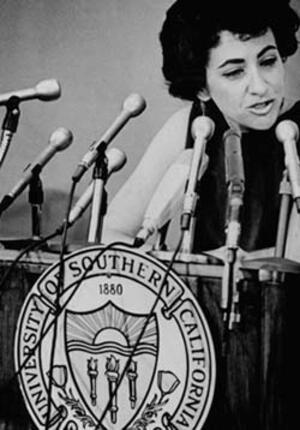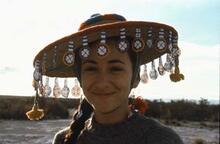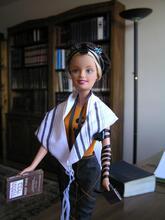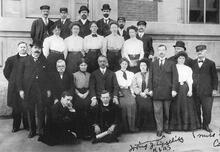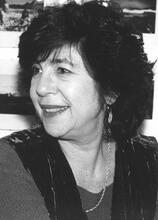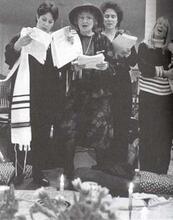Barbara Myerhoff
Barbara Myerhoff was a renowned feminist anthropologist whose work revolutionized the study of gender and ethnicity. Myerhoff received her doctorate from the University of California at Los Angeles in 1968 and taught at the University of Southern California. Taking seriously comments from leaders in communities of color who told her to “study your own,” she conducted a pioneering study of the elderly Jewish community of Venice, California. Particularly interested in how women practiced Judaism, a patriarchal religion, she found among the seniors vibrant “domestic” religious practices. Her film, Number Our Days, won a 1977 Oscar for best short documentary film and two Emmys, and the book of the same name received many awards. Myerhoff’s work illustrated the intersections between gender, age, and ethnic identity, and reshaped how we view our own communities.
Anthropologist Barbara Myerhoff looked at the camera in her documentary film Number Our Days and explained, “Someday I will be a little old Jewish lady.” Giving this as the reason for her study of elderly Jews, she helped to initiate a rethinking of anthropology. Locating herself within her scholarship, she declared that those who are like us—even part of us—are as worthy of study as those cultures thought of as “exotic.”
Early Education & Scholarship
Barbara Gay Siegel Myerhoff was born on February 16, 1935, in Cleveland, Ohio. She was raised there and in Los Angeles by her mother, Florence Siegel, and her stepfather Norman Siegel. She married Lee Myerhoff in 1954 and divorced him in 1982. She had two sons, Nicholas (b. 1968), and Matthew (b. 1971). Always a gifted student and storyteller, she had an outstanding academic career. She received a Bachelor of Arts degree in sociology from the University of California at Los Angeles in 1958. At the University of Chicago, she received a master’s degree in human development in 1963. She returned to the University of California at Los Angeles to complete a doctorate in anthropology in 1968.
Myerhoff’s initial scholarship was devoted to the developing field of ritual and symbolic studies. Her dissertation and subsequent book, Peyote Hunt: The Sacred Journey of the Huichol Indians (1974), was a highly regarded work of scholarship for its treatment of pilgrimages and the religious life of a Mexican Indian group. Myerhoff was the first non-Huichol to participate in the sacred annual pilgrimage of the Huichol people, and she used the occasion to understand how rituals and symbols act to communicate the central meanings and memories of a people cut off from their homeland and forced to live within a dominant culture that was hostile to them. The book was nominated for a National Book Award in 1976.
Study of Elderly Jews & Women’s Religion
Barbara Myerhoff explored these same themes in her innovative study of elderly Jews in Los Angeles. The work developed as part of a collaborative project on aging at the University of Southern California, where she taught in the department of anthropology for her entire professional career, from 1968 until her death in 1985. She had initially considered work with other ethnic groups, but decided to study Jews for her portion of the project. In 1971, in a period of increasing ethnic pride and militancy, she took seriously comments from leaders in communities of color who told her to “study your own.” Neither American Jews nor the elderly had received much attention from anthropologists, and the urban American setting was rarely their subject of study. Myerhoff took a major risk with her career to focus on a group so entirely overlooked by scholars.
Myerhoff’s study of elderly Jews who met at a senior center in Venice, California, demonstrated the ways in which rituals, both traditional and invented, gave the aged the visibility of which society and family had deprived them. Performances of all types—storytelling, rituals, even fights—provided a certainty of their place in social interaction that was reassuring and tenuous at the same time, since their ability to hold others’ attention could easily be lost. From these observations Myerhoff wrote eloquently and persuasively about the human need to be seen and the ways in which culture offers and withholds that visibility. Myerhoff found and wrote about the resilience, continuity, and innovations in seniors’ lives. In articles that appeared in Secular Ritual, edited by her and Sally Falk Moore, as well as in other journals and collections, she developed and illustrated these points.
In one of her first publications about the Jewish elderly, she noted that women at the senior center appeared to age with more ease than men. She viewed women whose lives had been devoted to nurturing and caretaking as better able to accept aging, and as more resourceful in finding ways to continue to nurture others through their social activism and mutual support. Women were able to maintain more continuity in their lives than men who were wrenched away from the public world of work.
Another of Myerhoff’s most important contributions was her pioneering work on “domestic Judaism” and “women’s religion.” Her study coincided with the early years of the contemporary women’s movement, and she was particularly interested in how women practiced Judaism, a patriarchal religion. She found among the seniors vibrant “domestic” religious practices. Immigrant Jewish women told her about their sense of responsibility to maintain observance in the family and their memories of learning about women’s religious duties from mothers and other female relatives. She was a pioneer in challenging the notion that religion can only or best be understood from an elite perspective, usually dominated by males. Rather, her work demonstrated a well-articulated religious system for women that ran parallel to men’s sacred worlds. These early insights have been used effectively by a variety of writers and scholars to understand religion from a woman’s perspective.
Filmmaking
Prior to the publication of her book Number Our Days, Barbara Myerhoff made a documentary film about the Jewish seniors with filmmaker Lynn Littman. The film, also entitled Number Our Days, was awarded a 1977 Oscar for best short documentary film and two Emmys. Her book was deeply appreciated by both scholars and ordinary readers. It was chosen by both the New York Times and Psychology Today as among the ten best social science books of 1979. One of its chapters was awarded a Pushcart Prize for 1979, and she was selected as Woman of the Year by the Jewish War Veterans of America in 1980. The book was subsequently adapted as a play and produced by the Mark Taper Forum of Los Angeles in 1981.
Myerhoff’s interests in documentary and ethnographic film led her to develop a program in visual anthropology at the University of Southern California, where she chaired the department of anthropology from 1976 to 1980. She collaborated again with Lynn Littman on a second film, In Her Own Time, which documented her bout with cancer and the final weeks of her life, as she studied the Jewish community of the Fairfax district in Los Angeles. The film depicted her work with that community and how some of its members helped her to understand and deal with her final illness.
Legacy
Barbara Myerhoff died on January 7, 1985. She never lived to become “an old Jewish woman,” as she imagined she would when she set out to understand what it meant to be aged and Jewish in American society. Not quite fifty years old, she left a remarkable intellectual and personal legacy in her prodigious writing and filmmaking. She reached a wide audience of readers and viewers because of her commitment to tell stories that could help men and women understand their own lives in light of what she saw in communities in “her own backyard,” as well as the far reaches of northern Mexico.
Barbara Myerhoff was part of a small group of scholars in the 1970s who introduced the importance of understanding storytelling, who pioneered the study of one’s own community, and who paid attention to the relationships among age, ethnic identity, and gender. She was particularly innovative in her scholarship on ritual, exploring how ritual functioned to create its effect, even when participants aided in its invention. Her ideas provided an important foundation for Jewish women to understand aspects of their own religious heritage and to experiment with ritual innovation while defining Jewish feminism.
In 2000, the Jewish Women’s Archive selected Barbara Myerhoff to be a Woman of Valor. In celebration of Jewish Women’s History Month, the organization created a poster about her life as well as a web exhibit.
Selected Works
“Bobbes and Zeydes: Old and New Roles for Elderly Jews.” In Women in Ritual and Symbolic Roles, edited by Judith Hoch-Smith and Anita Springs. N.p.: Plenum Press, 1978.
In Her Own Time. Film. Directed by Lynn Littman. Santa Monica: Direct Cinema Limited, 1984.
Number Our Days. Film. Directed by Lynn Littman. Burbank: Community Television of Southern California, 1977.
Number Our Days, Center Theater Group, Mark Taper Forum, Los Angeles, 1979 and 1981.
Peyote Hunt: The Sacred Journey of the Huichol Indians. Ithaca: Cornell University Press, 1974.
Remembered Lives: The Work of Ritual, Storytelling, and Growing Older, edited by Mark Kaminsky. Ann Arbor: University of Michigan Press, 1992.
“We Don’t Wrap Herring in a Printed Page: Fusions, Fiction and Continuity in Secular Ritual.” In Secular Ritual: Forms and Meanings, edited by Sally Falk Moore and Barbara Myerhoff, Assen: Uitgeverij Van Gorcum, 1977.
Kaminsky, Mark. Introduction to Remembered Lives: The Work of Ritual, Storytelling and Growing Older, by Barbara Myerhoff. Ann Arbor: University of Michigan Press, 1992.
Kirshenblatt-Gimblett, Barbara. Foreword to Remembered Lives: The Work of Ritual, Storytelling, and Growing Older, by Barbara Myerhoff. Ann Arbor: University of Michigan Press, 1992.
Prell, Riv-Ellen. “The Double Frame of Life History in the Work of Barbara Myerhoff.” In Interpreting Women’s Lives: Theory and Personal Narratives. Bloomington: Indiana University Press, 1989.

